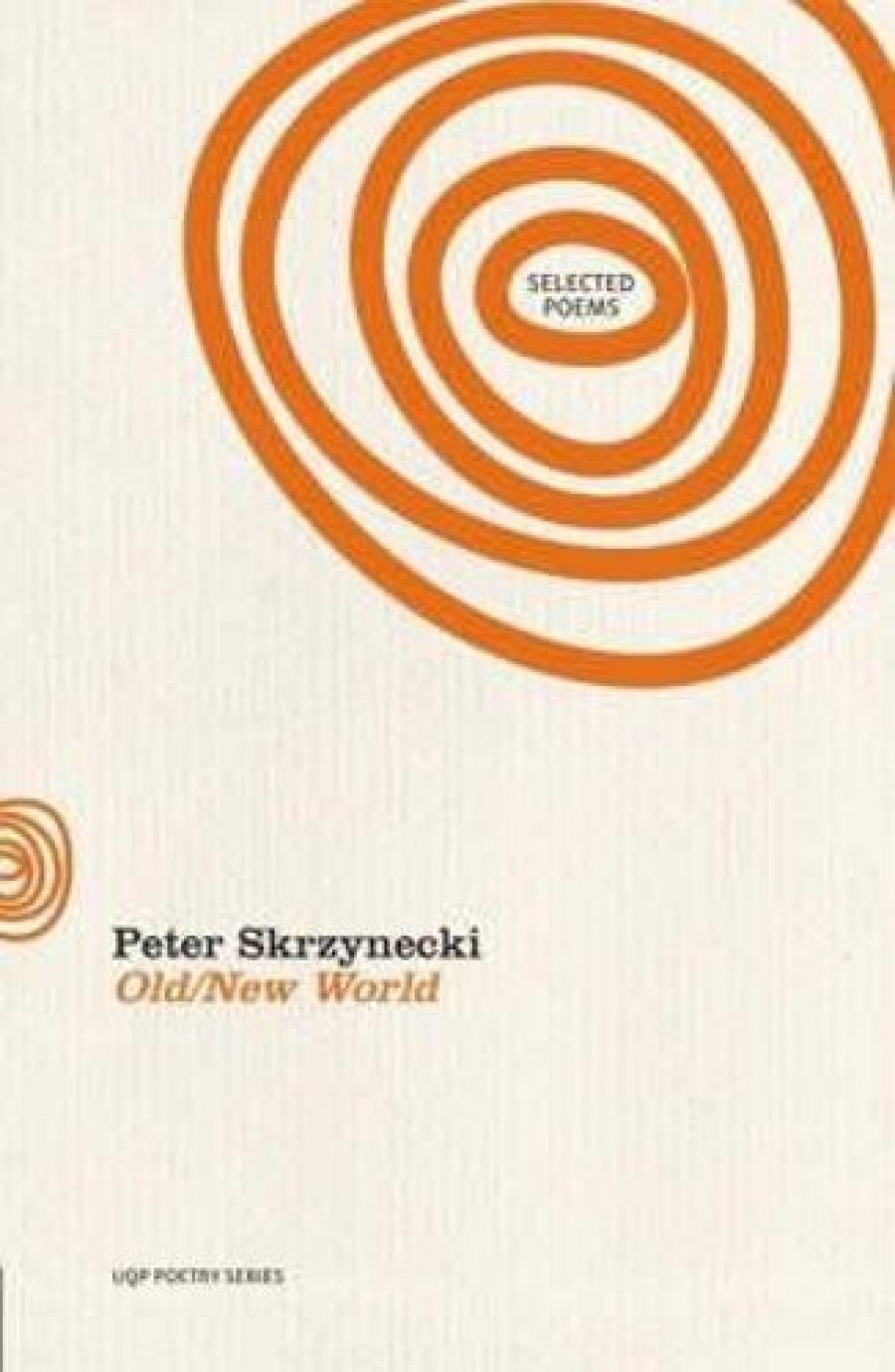
- Free Article: No
- Contents Category: Poetry
- Review Article: Yes
- Online Only: No
- Custom Highlight Text:
Peter Skrzynecki’s substantial Old/New World comprises selected work from his eight previous collections plus a new collection. From it we could extract his autobiography. We find the youthful son of Polish migrants; his growing awareness of his migrant ‘otherness’; his employment as a teacher in New England; the birth of his first child; the ageing and death of his parents; his passage through middle age and growing sense of his own mortality. Halfway through, ‘Letters from New England’ posits the poet as ‘the stranger from Europe’ – a surrogate title for this often moving compilation. Skrzynecki’s Polish parents came to Australia from Germany in 1949, and exile, for their four-year-old son, would be a recurring theme.
- Book 1 Title: Old/New World
- Book 1 Subtitle: New & selected poems
- Book 1 Biblio: UQP, $26.95 pb, 350 pp, 9780702235863
Skrzynecki’s move to Jeogla, ‘high in the New England ranges’ (‘The Year the Drought Ended’), became another form of exile, but this experience of the pastoral would yield poetic fruit for life. Birds call melodically to each other across the nine collections of this book; trees native and exotic throw graceful shadows and seed; an occasional kangaroo bounds from one stanza to the next. Throughout, the bucolic endures as one of this poet’s great strengths.
The collections are united also in their engagement with returnings to place – literal returns as well as those made through memory. Skrzynecki sometimes foregrounds this revenant activity in titles; hence we have ‘Jeogla’ and ‘Jeogla (2)’, written decades apart, and four takes on ‘Styx River’ (which runs through New England as well as through Greek mythology) from four different collections. The sting of separation from the natural world and from family – the two are often linked – is crucial. ‘Parents’, one of the best poems from Skrzynecki’s The Aviary (1978), paints a picture of aching regret:
They stand at the gate
like a part of the garden itself –
waving through shadows
already between us
Skrzynecki was only twenty-five when his first collection, There, Behind the Lids, appeared in 1970. Two years later, he published Headwaters. The early poems selected here display a remarkably controlled lyricism in such a young poet. There is little evidence of youthful overreaching. Skrzynecki established early an exceptional ability to capture delicate moments of reflection. In ‘Lorikeets’, the imagery is as beautiful as anywhere in the volume, with ‘nomads’ that ‘skimmed the river like driven snow’ before ‘… leaving a forecast // of hail or mountain fires / written in a strange, piercing tongue / on every tree and morning dream they had ravaged’. Headwaters also produces, with ‘Migrant Bachelor’, the first poem dealing explicitly with that other ‘strange tongue’, the non-English-speaker, and is a forebear to Skrzynecki’s best-known collection, Immigrant Chronicle (1975).
Death is another frequent theme, ranging from ‘Elegy for Don McLaughlin’ (‘Your voice … drew admiration / as death draws silence’), through the ‘Rookwood Cemetery’ suite with its catalogue of graves, to later poems grappling with grief after the passing of the poet’s parents – losses mediated to some extent by his religious belief. Honouring the memory of the departed while maintaining sufficient detachment to create an aesthetic is not easy. Understandable though it is, many later poems display escalating nostalgia (for family, for place) and encroaching sentimentality, as in ‘Sayings’ and ‘Strawberries’. Skrzynecki’s most eloquent poems of remembrance are often moderated by an object or symbol. Hence, ‘A Bag of Oranges’ (‘stacked on top / of the baggage like the rest / of my parents’ hopes’) and ‘My Father’s Hammer’ provide touching portraits in articles at once intimate to, yet at one remove from, those dear to the poet.
The new collection, Blood Plums, contains some less convincing, as well as some of the more affecting, poems in the book. This might be due in part to Blood Plums being a new collection published here in its entirety, whereas the other collections are effectively represented by ‘the best’. It reflects also a shift towards increasingly narrative-driven poems that, despite the occasional use of rhyme, often forsake the lyrical for more prosaic descriptions. Skrzynecki has, to his credit, always eschewed the poetic high-wire act, but in some poems he might have binned the safety net of explanation and let the poems, and the reader, make exploratory leaps. Poems such as ‘Turning Sixty’ and ‘Regents Park’ seem too diaristic, too much like lineated prose. And the nationalistic ‘Immigration Bridge’, commissioned for the Canberra Immigration Bridge Project, might best have been confined to that project.
Despite these reservations, a number of excellent poems occupy the latter pages. The short lines of ‘In Basho’s House’ convey absence as well as a shrewd Basho-like simplicity, as if a cheery existentialism has met Edo period haiku half-way down the hall. ‘Inside the Holocaust Tower’ moves with its shaft of light and ladder out of reach. In ‘The Death of Virgil’, Skrzynecki, at a remove of two thousand years from Virgil, seems freed to draw evocatively on his own acquaintance with exile and return; and ‘Afternoon Rain’ showers the road home with lovingly sketched detail. Old/New World is a fitting tribute to a poet who, at his best, uses Wordsworthian lyricism to convey migrant experience to telling effect.


Comments powered by CComment